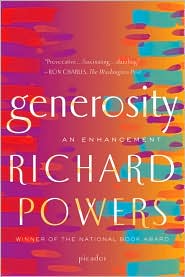When the shortlist for this year’s Arthur C. Clarke Award for the best science fiction novel published in Great Britain was announced a few weeks back, I was pleasantly surprised to see Richard Powers’ Generosity as one of the six nominees. Powers, who won the National Book Award in 2006 for The Echo Maker, has a sufficiently “literary” reputation that he isn’t usually categorized as science fiction, although his novels have often had a science fictional component—a subject I’ll be exploring in more detail in a “Genre in the Mainstream” post next week. For now, let’s just say that seeing Richard Powers and Tim Powers on the same metaphorical bookshelf was a very exciting feeling.
So: How much of a science fiction novel is it?
?Generosity has two interlocking storylines. In the main narrative, a “creative nonfiction” teacher in Chicago, Russell Stone, becomes obsessed with one of his students, an Algerian refugee named Thassadit Amzwar who, given the horrors her family has endured, has no business being as joyful and as exuberant as she is…nor as stable. As the college counselor Russell confides in says, “That isn’t mania. That’s what we in the mental health business call peak experience. And you’re saying she’s like that all the time?”
Her upbeat goodness isn’t just contagious, it’s transformative: When one of her classmates attempts to sexually assault her, he’s so shaken by her continued concern for his emotional condition that he “rolls off her like she’s burning… [and] curls up into a fetus on her carpet, moaning like a thing trying to be unborn,” then turns himself into the police the next morning, demanding to be locked up. Russell tells the investigating officers Thassa might be “excessively happy” because of a condition called hyperthymia. When that story leaks to the media, the resulting coverage is eventually found by intelligent agent software at Truecyte, a genetic research company, and lands in the news aggregator of CEO Thomas Kurton.
Readers have already been introduced to Kurton through the recurring secondary storyline, a transcript of an interview he’s given to Tonia Schiff, “America’s most irreverent science television journalist,” about the implications of genetic research for a show called Over the Limit. The show reveals him as a passionate transhumanist who believes “aging is not just a disease, it’s the mother of all maladies.” And depression is as attractive a target for his genetic research as the aging process.
Long story short: Kurton contacts Thassa, is as blown away by her attitude as everyone else, and invites her to participate in his genetic studies. She turns out to have an ideal arrangement of alleles in the genes believed to control the brain’s emotional centers—or, as it’s glibly labeled at the ensuing press conference, “the happiness gene.” I don’t want to spoil too much of what happens to Thassa from that point, but I will drop one hint: Chicago IS the home base of a world-famous media icon obsessed with the subject of happiness….
While all this is taking place, there’s an unnamed narrator—it could be Powers, but it might just as easily be a persona—ruminating on the storytelling process itself. “I see now exactly who these people are and where they came from,” the narrator muses near the halfway mark. “But I can’t quite make out what I’m to do with them.” Later on, the situation has gotten more drastic: “All I want is for my friends to survive the story intact. All the story wants is to wreck anything solid in them.” And then the narrator’s most radical assessment: “For now, fiction remains at best a scattershot mood-regulating concoction—a powerful if erratic cocktail like Ritalin for ADHD, or benzodiazepines for the sociophobe. In time, like every other creation, it will be replaced by better, more precise molecular fine-tuning.”
Yet there’s also a powerful respect for fiction; as Kurton says at a speaking engagement, “Imaginative writing has always been the engine of future fact.” The self-awareness of that sentiment, I’d suggest, tips Generosity into the category of explicit science fiction, but even without that statement, what we have is a novel in which the practical application of a scientific advancement—the “discovery” of “the happiness gene”—isn’t just a MacGuffin to push the story forward but an integral narrative element. Not only does the science of Generosity have the abstract potential to change lives, the exploration of that science DOES change the lives of the characters involved. (As a contrasting example, the alternative energy technology in another recent literary novel with scientific overtones, Ian McEwan’s Solar, is essentially a background element, with the story itself focused squarely on the protagonist’s personal and professional crises.) Using that standard, you could easily shelve Generosity next to acknowledged SF benchmarks such as Gregory Benford’s Timescape or Connie Willis’ Passage.
Finally, there’s the existential answer: Even though the 2011 Clarke Award ultimately went to Lauren Beukes for the novel Zoo City, simply by nominating Generosity, the selection committee has effectively resolved the question of whether Richard Powers is a literary novelist flirting with science fiction or a full-on (literary) science fiction writer. And it’s not just Generosity—in next week’s “Genre in the Mainstream” post, I’ll talk about the ways Powers has been doing science fiction throughout his literary career.
Ron Hogan is the founding curator of Beatrice.com, one of the first websites to focus on books and authors, and the master of ceremonies for Lady Jane’s Salon, a monthly reading series in New York City for romance authors and their fans. (Disclosure: N.K. Jemisin read from The Hundred Thousand Kingdoms at Lady Jane’s Salon.)











Nice to see Powers get a bit of recognition. Echo Maker and Gain are books of the same sort – the science is so well integrated into the story that it would fall apart without it. Powers exemplifies a new, or at least previously rare, literary sort, one who’s familiar and comfortable with science. Wish that there were more like him.